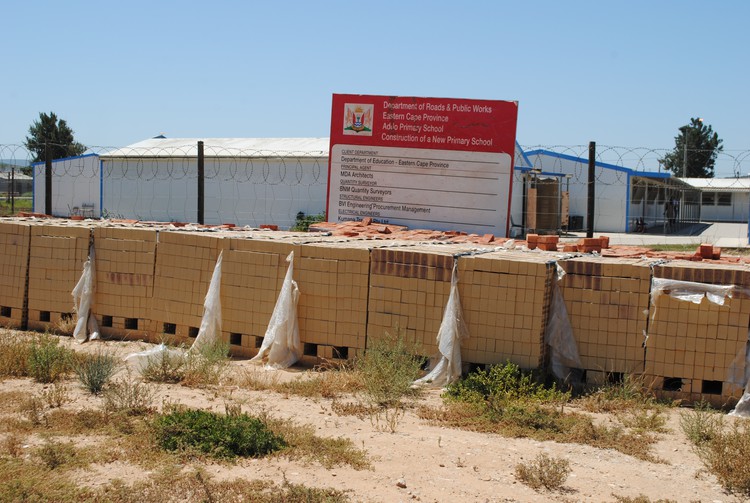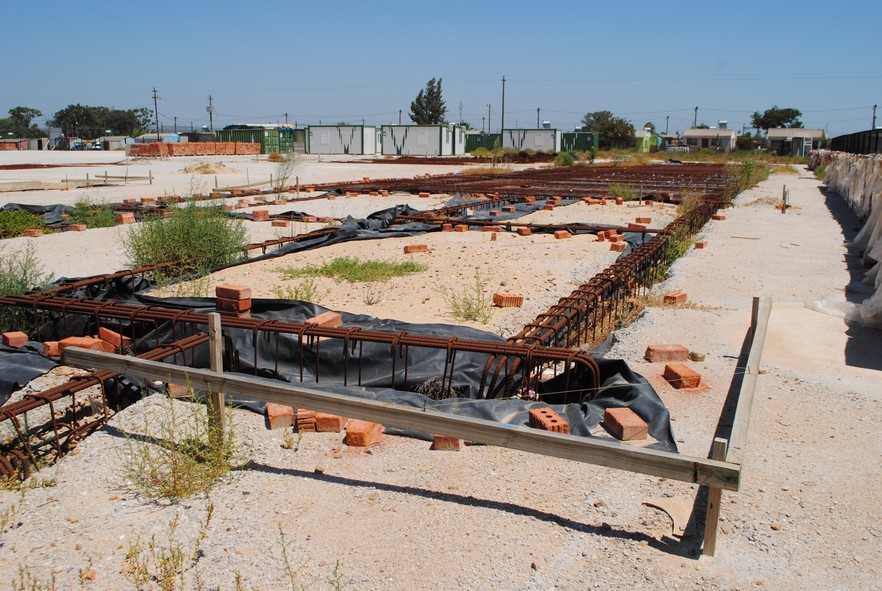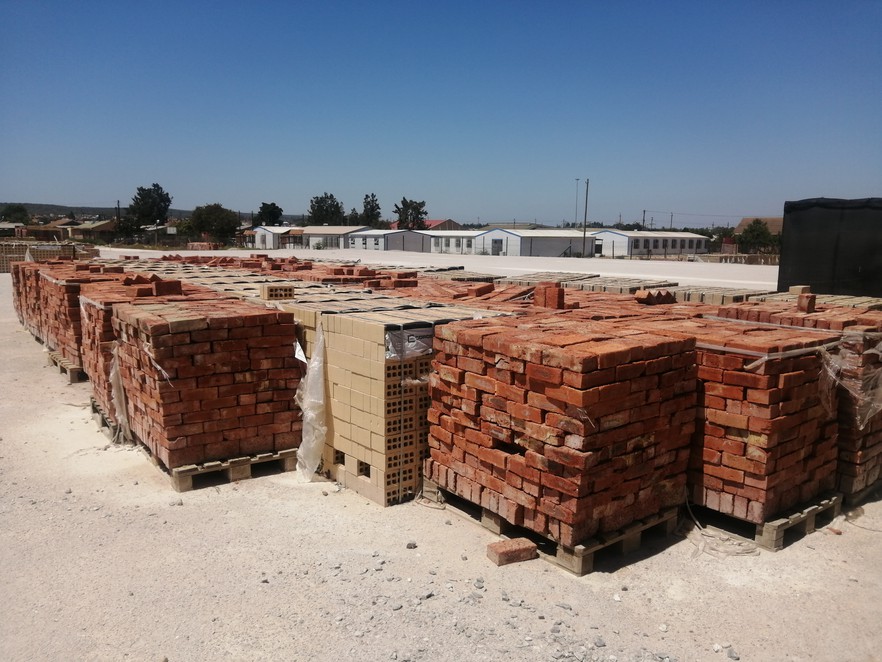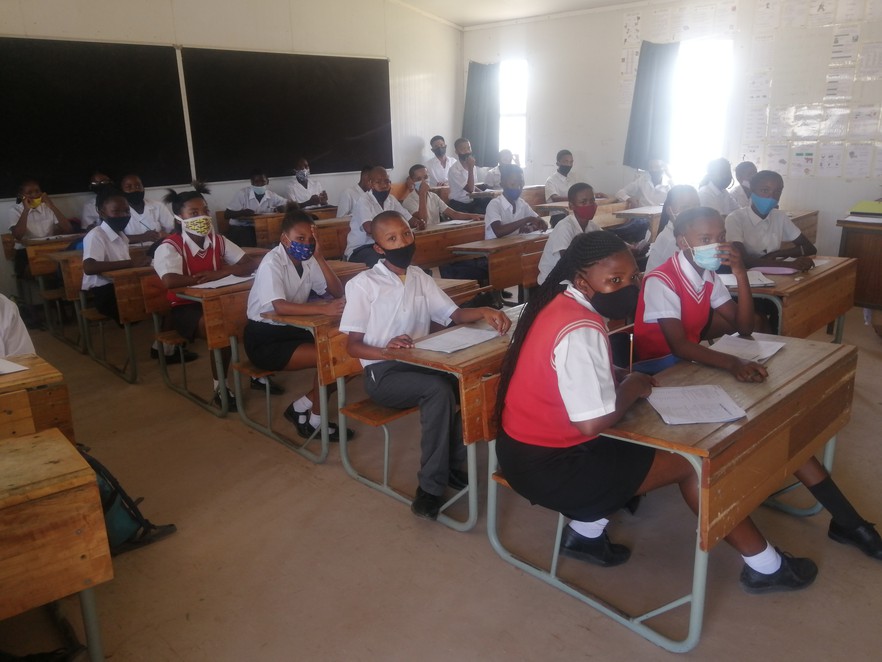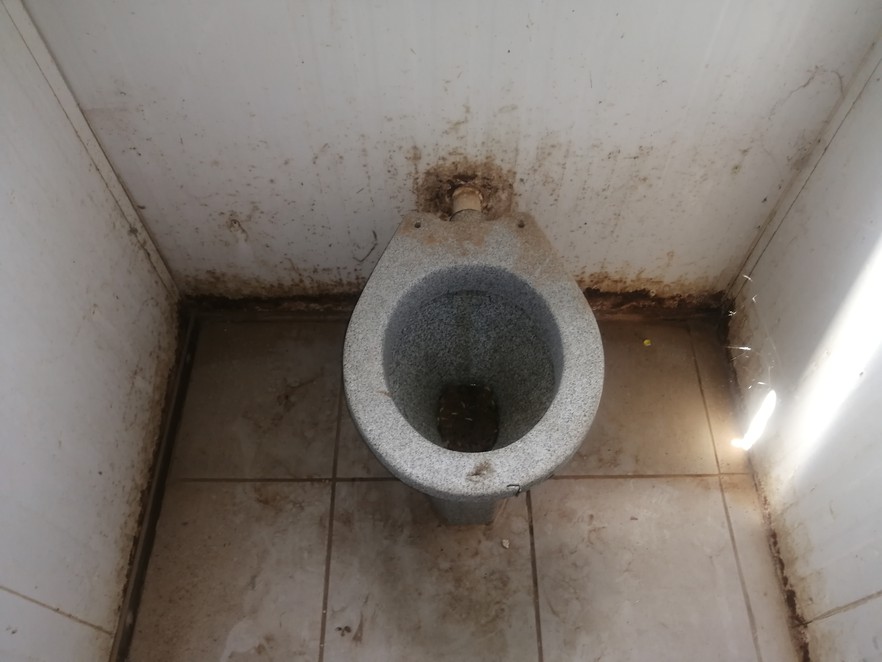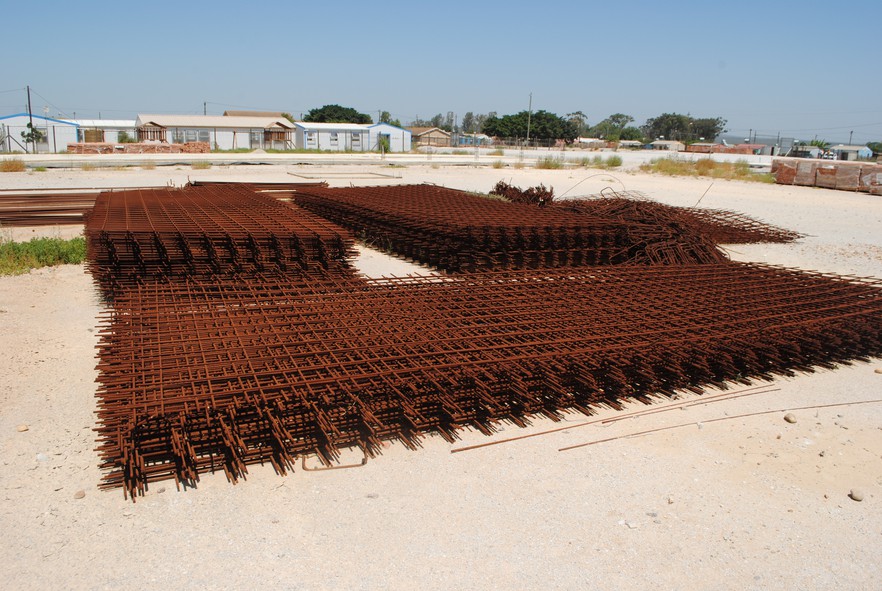School’s dream dashed as donor fails to pay up
Rashid Khan promised tens of millions of rands to an Eastern Cape school but both he and the government have let the community down
The abandoned construction site of Addo Primary School. All photos: Mkhuseli Sizani
Each weekday, almost 1,000 children from Valencia township and the surrounding area pack into 22 prefabricated classrooms at Addo Primary School. For over a decade, the community has fought for new permanent school buildings without success.
Promises of a new school from the provincial education department came to nothing. When a would-be donor, ACMR Capital, arrived from the blue promising to take care of the construction, the community thought their struggle was over.
But soon after building began, payments to the construction company stopped, and they abandoned the site. Now the children spend their days surrounded by half-dug foundations and bricks.
Valencia’s struggle for a permanent school
The new school building’s forgotten foundations.
Boy Brander is a community leader who has been leading meetings with ACMR Capital, the Department of Education and the Department of Public Works.
He told GroundUp the school was first established in 1934 at Roselane Church. In 1991 it was relocated into a prefabricated building in Addo town. This building was worn down over the years, and classrooms were overcrowded. The community called on the Department of Education to construct new permanent buildings.
In 2007 the Department promised the community that it would build a R68 million state-of-the-art school with a computer lab, science lab and library.
In 2009, parents and community members, frustrated by a lack of progress, shut down and demolished the school to pressure the department into action. The school ran classes for about a year at various churches. The department promised to start building the new school in 2011, and provided 22 prefabricated classrooms that year as a temporary solution.
“The project was delayed because there were a lot of squabbles between the education and public works departments over the appointment of contractors,” said Brander. “We saw other schools in Kariega being prioritised ahead of us.”
“In 2017 we went to the Kariega Education District offices and handed in our petition. We were then promised that construction would start in 2018.”
Again, this promise was not kept. The community held a series of protests in 2018 and the education department seemed to finally take action.
The Department of Public Works was appointed as the implementing agent for the project, and in November 2018 Faranani Construction was appointed to construct the school.
But in 2019, this construction company abandoned the site after it wasn’t paid. The Department of Public Works also pulled out of the project apparently due to squabbles over appointment of contractors.
This is a common occurrence — in 2018, construction was abandoned at 37 school sites in the Eastern Cape due to non-payment by the provincial education department, according to a report in the Daily Dispatch.
Brander said the education department later told them it had no money for the project.
The R95 million donor
Brander told GroundUp that one day officials from the departments of education and public works introduced him to a businessman who said he wanted to help.
This was Rashid Khan, Chief Executive Officer of ACMR Capital, a Randburg-based company.
Khan told Brander that he wanted to help the community build the school of their dreams.
“Khan stepped in and promised to build our school for R95 million with the help of overseas donors,” said Brander.
The provincial education and public works departments were eager to cede responsibility. They signed a memorandum of understanding with Khan and formally handed over the project to his company’s care in 2019.
In August 2020, ACMR appointed MDA Architects as the principal agent for the contract to build their state-of-the-art school, with a library, science lab and computer lab, which was now to cost a total of R97.7 million.
ACMR Capital appointed GVK-Siya Zama and Itha Plumbing and Civil Construction in August 2020 in terms of a Joint Building Contracts Committee building agreement, which was ultimately signed in November 2020.
The agreement describes a magnificent, modern school: an administration block, a computer laboratory and library, a science laboratory, a nutrition centre, netball courts, gardens, a number of classroom blocks with ablutions, full plumbing, a water tank, and a water reticulation system.
A false start
Building materials await builders.
Material was delivered to the school’s grounds in September 2020.
Work began in earnest in December 2020. Foundations were dug, pipes set, bricks laid.
ACMR’s first payment was sent to GVK-Siya Zama via MDA Architects. But the second payment for R19 million, due by 7 December, never arrived. Four more payments, for dates up-to April 2020 and worth a further R9.8 million, were missed.
Attorney Peter Barnard from Cox Yeats, representing the construction firm, told GroundUp that in terms of the contract, certificates were to be issued on a monthly basis, reflecting the value of the work carried out and were supposed to be paid within seven days. Certificates two to six were issued but not paid.
These missed payments meant that GVK-Siya Zama and its partners were forced to abandon the project in January 2021.
Community leaders tried to get answers why construction had stopped. “We tried to get hold of Khan but he made a series of empty promises. Sometimes he would say the money would be paid within 21 days or 60 days. But that never happened. We tried to engage the department on this matter but it distanced itself from the project,” Brander said.
Ward 3 councillor Xolani Jonas also tried to call the contractors and Khan to resolve the matter. “Khan is always making empty promises that he will pay the contractors,” he told GroundUp.
After months of frustration, GVK-Siya Zama and fellow contractor Itha Plumbing took the matter to the Johannesburg High Court in June 2021 to claim back the R28.5 million they were owed.
“After launching a court application, the parties engaged and concluded a settlement agreement that the outstanding amount would be paid by 28 September 2021,” said Barnard. “But no payment was made.”
The contractor then approached the court again. In terms of a court order signed on 27 January by Johannesburg High Court Judge Shanaaz Mia — which incorporated a settlement agreement between the parties — ACMR Capital has to immediately pay GVK-Siya Zama Building Contractors and Itha Plumbing and Civil Construction just more than R28.5 million.
“Further discussions regarding payment are underway. Should those discussions ultimately be unsuccessful, further legal steps will need to be taken. The contractor is disappointed by the ongoing payment issues and hopes it will be resolved soon, whereafter work can resume,” Barnard said.
Khan told GroundUp that ACMR has no intention of abandoning the project, but did not say why the payments stopped.
“We have submitted a payment proposal to the contractor. If accepted, all parties need to have a round table to conclude this process and costing.”
Khan did not respond to further questions from GroundUp, in particular about the source of the so-called foreign donor funding.
A community in waiting, again
A full classroom.
Bricks, steel, sewage pipes, wires and foundations from the stalled construction lie about the school grounds, getting damaged by weather.
Classrooms are often overcrowded, and the summer heat creates sweltering conditions. The school’s 930 learners from grade R to grade 7 are distributed over 22 prefabricated classrooms. Boy and girls also share 18 toilets between them; most are broken. There is no playground for learners.
Abraham Jasson, the school principal, says he has to send learners home when the temperatures are between 32° and 35°, because they can’t concentrate in class.
He says the delays to the project are affecting learning and teaching.
“Initially we had 16 classrooms and we kept on asking the department to build us more because our school is overcrowded. We are still overcrowded but the rotation system due to Covid-19 is helping us. But when things go back to normal we won’t cope. Grade R and 7 would be the most affected classrooms. We would be forced to have 66 learners in a class in grade 7,” he said.
The school is likely to get more crowded in the near future. In September 2021, GroundUp reported that a small school nearby is to be shut down by the education department, and most of its learners will be transferred to Addo Primary.
Elizabeth Boewas attended Addo Primary and has been a teacher at the school for 25 years. “Our periods are 50 minutes but learners only concentrate for 30 to 40 minutes because it is too hot in the classrooms,” she said. “Sometimes we use the staff room as a classroom. We are lucky we are a group of dedicated teachers hence the learners performance is still good even though they study under these abnormal conditions.”
Bevan Solani, a grade 7 learner, was disappointed by the delays. “We can’t concentrate in the prefabricated classrooms because they are too hot,” he said.
Sinolwethu Mhatu, a general school assistant, said almost all the toilets are faulty. As you enter them you are met by an unpleasant smell.
“There are only three working toilets for boys and two for girls. Every day we have to fill up five-litre water bottles to flush the toilets. Some of these toilets have maggots,” she said.
A maggot-filled toilet.
Responsibility shirked
Brander says the department should be held accountable for this project.
“We want the Human Rights Commission to hold the department accountable for misusing the money that was allocated for our school. Also for subjecting our children to these terrible learning and teaching conditions,” he said.
Councillor Jonas also said the education department should take full responsibility and resolve this matter.
“Before I became a ward councillor we decided to stand up and fight for the future of our children as a community of Valencia. The education department must take full responsibility and make sure this project gets done. It is the department that promised to build this community a school. We feel that it is now shifting the blame to the donor.
“The school belongs to the department, not to the donor. Hence we feel that the learners’ rights have been violated here.”
The Department of Public Works directed all questions to the Department of Education.
But Malibongwe Mtima, the provincial education spokesperson, couldn’t answer our detailed questions about the R68 million that was budgeted for the school.
He said, “The matter has been brought to the attention of the department and we are working around the clock to ensure that it has been attended to. We are talking to the district and all affected parties to resolve the matter.
“But we have nothing to do with the case. It is a matter between the contractors and a donor.”
Fast-rusting rebar.
Next: Walking Bus volunteers demand pay and recognition
Previous: Immigrant security guards head to court over unfair dismissal payment
© 2022 GroundUp. This article is licensed under a Creative Commons Attribution-NoDerivatives 4.0 International License.
You may republish this article, so long as you credit the authors and GroundUp, and do not change the text. Please include a link back to the original article.
We put an invisible pixel in the article so that we can count traffic to republishers. All analytics tools are solely on our servers. We do not give our logs to any third party. Logs are deleted after two weeks. We do not use any IP address identifying information except to count regional traffic. We are solely interested in counting hits, not tracking users. If you republish, please do not delete the invisible pixel.

